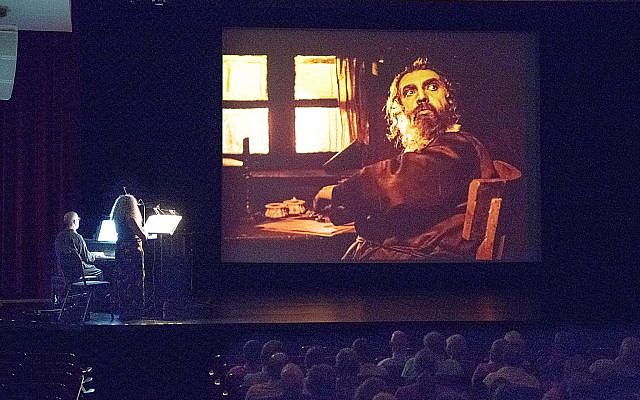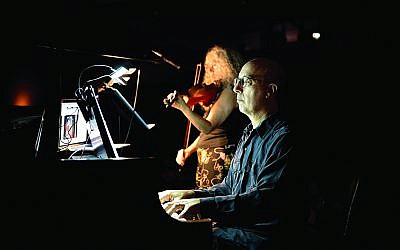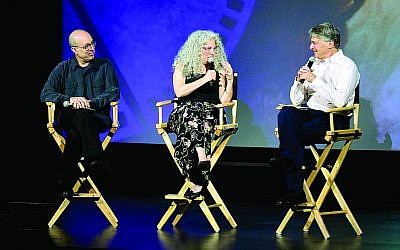Music Modernizes Silent Film at the AJFF
Woodruff Arts Center was the hub for AJFF's screening of The Ancient Law, a silent film put to music.

Two of America’s greatest performers of film music from the silent era accompanied the Atlanta Jewish Film Festival’s screening Sept. 6 of “The Ancient Law” at the Woodruff Arts Center. The silent film from 1923 is about Jewish life in 19th century Vienna.
Pianist Donald Sosin’s family roots go back to the Jewish communities of East Europe and violinist Alicia Svigals’ childhood education was shaped by the Yiddish speaking schools of Der Arbeter Ring, the Workmen’s Circle in New York. Today, she is generally considered among the world’s greatest interpreters of Jewish klezmer melodies.
It is ironic that the interests of both musicians helped them build their careers and develop a body of work in two distinct genres have had a remarkable resurgence in the last several decades. Both silent film productions and klezmer music, while seemingly worlds apart, have developed large, new audiences – particularly among young people. “The Ancient Law,” the film they both helped score and accompany, brings to the forefront these two strands of popular culture that have been reborn in recent years.
The film tells the story of the rise of a popular actor, born in one of the many poor, Jewish villages of Eastern Europe, who puts much of his ancient heritage behind him to find success in the Royal Court Theatre of the Habsburg emperors of Vienna.
His story of stardom mirrors the success of many Jews of western Europe in the 19th and early 20th century who largely abandoned their traditional heritage in favor of a new life of acceptance and assimilation.
I spoke with both Sosin and Svigals about their collaboration on “The Ancient Law.”
Sosin: Both of us wrote lots of music that was notated, but both of us are happy to be improvising. And our thoughts about the film change with each screening. We try not to tie ourselves down to the sheet music and we have not had to count measures, so we like to have the opportunity to wing it. Partly because of the tradition of Jewish folk music nothing was written down in those days, most of it was a very freewheeling and very improvisatory style of music.
Svigals: My approach to klezmer is based on the idea that it is half reconstructed and half invented. I put it that way because my feeling about all kinds of music is, if it is not half-invented then it is a dead museum piece. Music is always changing, and musicians are artists who bring their creativity to it. But if it is not half-invented, it is probably not worth listening to.
Sosin: My parent on both sides are of Eastern European ancestry, so the world that the film portrays has a great deal of resonance for me. I grew up singing Yiddish songs, writing Jewish music for synagogue productions. There are quite a lot of scenes in the film that depict rituals at Yom Kippur and Purim and Passover and Shabbat services at home. Audiences really get a sense of what it is like to be in that milieu in Europe.

Svigals: In a way, we are recreating that world. This is a silent film, so you can’t hear their voices, so we are trying to be their voices. We are conjuring up ghosts here.
Sosin: The audience goes into these silent films in a different way because of the absence of speech. They are really drawn into the film, and the music is a kind of emotional undercurrent to give them hints about what is going on. It helps move along the character development and the feeling. It’s quite a subtle art, and quite a few of the greatest silent films are unmatched. Audiences who may not be familiar with silent film are given the chance and invariably may come back for more.
Sosin: The audience of 800 at the San Francisco Silent Film Festival were on their feet cheering at the end; it’s very powerful. Even if you’re not Jewish, the idea of a kid wanting to go out and make his mark in the world and his father saying, “No, you have to stand by the family traditions” has a universal appeal.

Last week’s performance at the Woodruff Arts Center also got a standing ovation for Sosin and Svigals, who are beginning a fall tour that will take them and “The Ancient Law” to screenings in Italy, Slovenia and Croatia, as well as Philadelphia, Houston, Boston, and Silver Springs, Md.
For those who missed the AJFF showing, “The Ancient Law,” with a musical accompaniment by Sosin and Svigals, it can be purchased at www.flickeralley.com/classic-movies.



comments